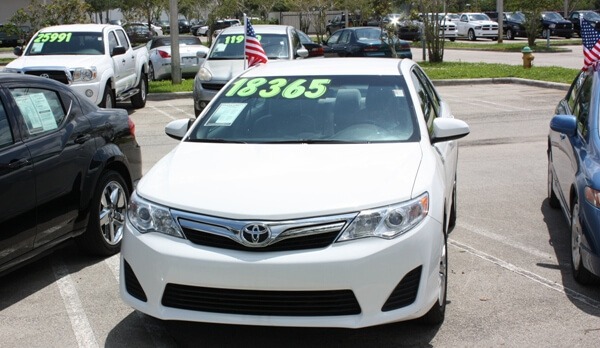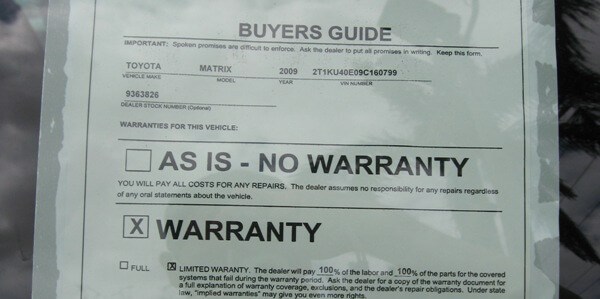What to Know When Buying a Used Car
The first thing to know about buying a used car is that there are two completely different paths to take. You can either buy from a dealership or a private party. Within the dealership category, there are a few different types as well. There are large dealerships that sell new and used cars, large used car only dealerships (like Carmax) and smaller lots which tend to be "buy here, pay here" places.

Wherever you purchase from, a used car will give you the ability to get more vehicle for your money. On the flip side, you have to be more careful because you can find the full spectrum from perfectly maintained, near mint condition all the way down to vehicles that have been totaled or salvaged.
Private Party vs. Dealership
Before you embark on your journey to finding a car, you need to know the difference between buying from a dealership versus a private party seller. Some buyers make this decision based on where they find a match for the make, model, year and condition that they are looking for. Others will prefer one over the other based on the differences we will talk about.
Pricing
You will almost always get a better price from a private party. Somebody selling a car by themselves does not have to pay for overhead and employees so you don't have to contribute towards those expenses with your purchase.
Additionally, the salespeople working at a dealership are professional negotiators. They know how to manipulate the situation and convince you to pay more. Most private sellers are just trying to get more money than they were offered to trade in their car.
Keep that in mind if you are negotiating with a private seller. I would recommend checking the trade in value of the car and make your first offer just slightly above that.
Customer Service
Just as you will almost always get better pricing from a private seller, you will always get better customer service at a dealership. Even a sleazy dealership wants customers to keep returning and to recommend them to others. A private seller really has no need to give any level of customer service. Once they sell their car, they will never see you again and it may be years before they sell another one.
Protection
Buying a used car will always come with some risk. Even the best vehicle history reports can't catch every issue on every vehicle. Unless you were to pay a mechanic thousands of dollars to tear the engine down and rebuild it, they can't see every potential problem.
If you buy a new enough car, you might be lucky and it will still be covered by the manufacturers warranty for some period of time and mileage. Having this coverage is the ideal situation but many used cars have already exceeded the age or mileage required. You might also get lucky and find that the original owner has purchased a transferable extended warranty. In this case, you should always ask to see the contract with the fine print to verify that it is transferable.
If the car isn't still covered and you don't purchase an extended warranty, you will have very little protection. However, most dealerships offer some kind of very short term (typically 30 days) warranty. Additionally, if you start having major problems, a reputable dealership will have some motivation to help you because they don't want to get a bad reputation.
Beware of the Dreaded "As Is" Window Sticker
When you are shopping at a dealership, the last thing you want to see is an "as is" on the window sticker or on a separate sticker. This is a huge red flag and should make you start shaking in fear. If the dealer isn't willing to give you a measly 30 day warranty, what can you expect from this vehicle? We recommend that you stay far away from any used car being sold "as is" by a dealership.

Dealerships are a little less likely to participate in any illegal or borderline illegal fraud such as rolling back the odometer. If they get caught, there will be major consequences probably involving the Attorney General's office. No legitimate business should want to risk that type of exposure. Also, if you find fraud and sue a dealership, your judgment is likely to be paid. Good luck collecting from an individual without spending thousands in legal fees. Don't let your guard down just because it is a dealership.
Vehicle History
When you buy a used car, the history of that particular vehicle is very important. You definitely need to know if there are any issues with the title. You'd really like to know if the car has been in any accidents and you'd like to know how well it was maintained.
A vehicle history report can help you find out what you need to know. They are very good at finding issues with the title. They are pretty good at spotting odometer rollbacks (although these can slip through the cracks). If somebody is very careful and methodical when rolling back an odometer, it is nearly impossible to catch. Vehicle history reports are also pretty good at reporting accidents but will not catch all of them. The reports will have maintenance records on some vehicles as well. We do recommend that you always run your own vehicle history report on every car you consider buying.
Running your own report will ensure that the seller can't pull a fast one by showing you an altered or out of date report. We have found the best value to be the AutoCheck 25 report package..
We always recommend that you have a mechanic inspect the car on a lift before you finalize your purchase. They can't see everything but they are trained to spot accident repairs and other signs of trouble.
Certified Pre-Owned
I am always amazed by really sharp marketing experts. Many years ago, somebody came up with the brilliant idea to start calling used cars "pre-owned" instead. Psychologically, this change in semantics makes you picture Jay Leno's pristine exotic car collection instead of a 1992 Corolla covered in dents and primer with duck tape around the window frames.
After that, somebody even smarter came up with the idea to add the word "certified" to the description. Now you picture a team of expert technicians in lab coats diligently inspecting every screw to ensure that the car is in better condition then when it rolled out of the factory.
Don't fall for the marketing gibberish and let your guard down. These certified pre-owned cars are being certified by the same place that is selling them. When you buy a steak, it is certified Grade A by the Department of Agriculture. It would be meaningless, if it was certified by the supermarket that you are buying it from.
You will read all kinds of things like the specially trained technicians do an exhaustive hundred and something point inspection. Basically, this means that they gave the already trained technician a quick course on what to look at and they gave the car a once over. They will make sure everything works and take it for a quick test drive to make sure there are no glaring problems. If you have some level of knowledge about cars, you can do this same inspection yourself.
The one benefit to some of the certified pre-owned programs is that they come with an extended warranty. It may be worth paying extra for a car that is covered, but don't pay more than it would cost to buy an extended warranty for a cheaper vehicle. You should get extended warranty quotes from CARCHEX so that you know what it will cost to buy one and how much of a premium it is worth for a car that comes with one.
Be Prepared
You should educate yourself as much as possible before going out to buy a used car. You should read our entire used car buying guide ahead of time. Once you are ready to start looking, we recommend starting your search with RydeShopper and TrueCar.

About The Author: Lyle Romer is a consumer advocate, Founding Contributor and Vice President of CarBuyingTips.com. A 20 years veteran of the auto industry with a high level of expertise, Lyle has been researching all aspects of the automotive sales industry.
Lyle's expertise and research played a vital role during the creation of CarBuyingTips.com in 1999 after years of industry research. He carefully observed every aspect of his own car buying experience as the internet began to take a foothold in the process. He also designed the site to make sure that consumers had easy access to the best consumer advocate education.
Lyle has been an auto industry insider since 1999. He also has worked with other automotive websites to help improve their offerings based upon feedback from CarBuyingTips.com users. He covers important industry events and gathers off the record sources while attending industry conventions.
Connect with the author via: Email







